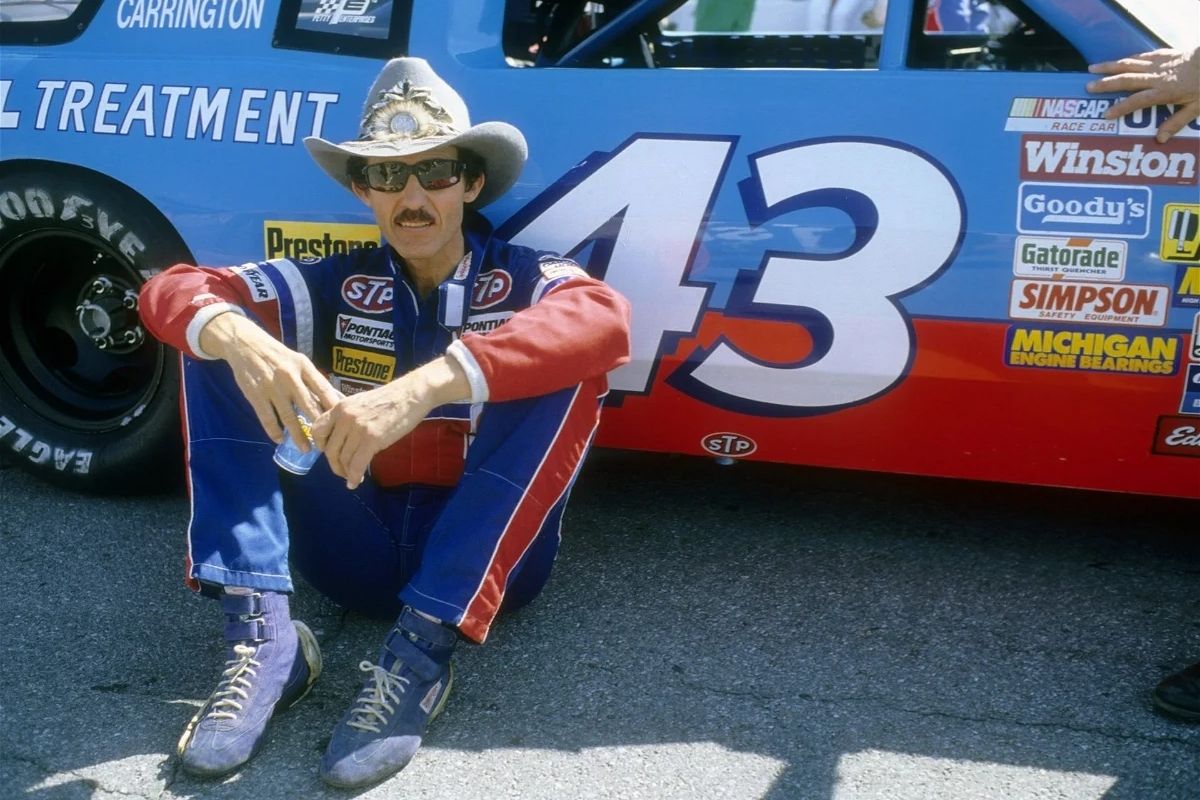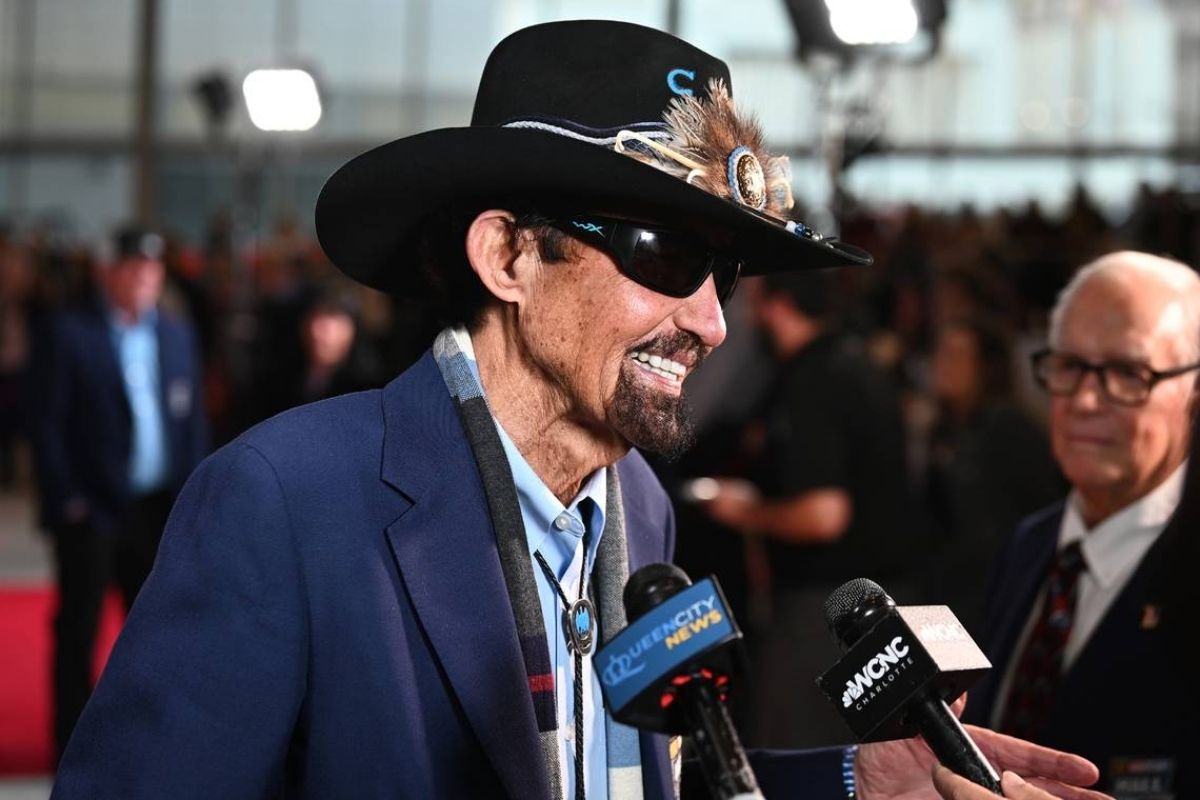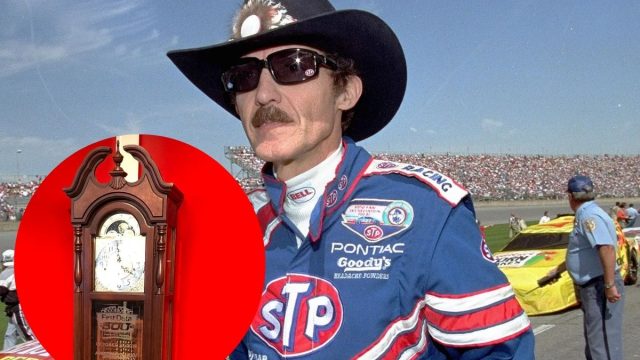Richard Petty Exposes NASCAR’s Grandfather Clock: In NASCAR, tradition and victory are often commemorated in unique ways, but perhaps none as distinctive as Martinsville Speedway’s grandfather clock trophies. Richard Petty, a legend in the racing community, offers a rare glimpse into the significance of these timepieces, humorously rebranding them as ‘grandmother’ clocks. His reflections not only illuminate the historical importance of these awards but also show the deep-seated traditions that have come to define NASCAR’s cultural heritage. As we explore Petty’s candid insights, we uncover the untold stories that these clocks carry, inviting us to reconsider their role in celebrating the milestones of racing legends.
Key Takeaways
- Richard Petty humorously referred to the Martinsville grandfather clocks as ‘grandmother’ clocks due to their original smaller size.
- The grandfather clock trophy symbolizes endurance and precision, mirroring the challenges of racing at Martinsville Speedway.
- Petty’s collection of Martinsville clocks, awarded for his victories, were distributed among family, showcasing their sentimental value.
- The evolution in the size of the clocks reflects their growing significance within the NASCAR community over time.
- The tradition of awarding a grandfather clock as a trophy started in 1964, with Fred Lorenzen as the first recipient.
Origins of the Martinsville Speedway Tradition
In 1964, the venerable Martinsville Speedway inaugurated a unique tradition within the NASCAR Cup Series, awarding a grandfather clock to the victor of its races, a practice that began with Fred Lorenzen’s triumphant win. NASCAR legend Richard Petty has also won at this track for 15 times. This initiation marked a departure from conventional trophies, offering something majestic and timeless. The choice of a grandfather clock, an item embodying endurance and precision, mirrors the qualities required to dominate at Martinsville, known for being the shortest track in the series but not short on challenges.
Martinsville Speedway, with its rich history dating back to 1947, has always sought ways to distinguish itself within the motorsports community. The introduction of the grandfather clock as a trophy was not merely an innovative move; it was a stroke of brilliance that intertwined the speedway’s identity with a tangible symbol of achievement and prestige. This decision was symbolic of the speedway’s commitment to tradition and excellence, setting a standard that would become a coveted hallmark of success among drivers.

Richard Petty’s Reflections on the Clock Trophies
Reflecting on the storied heritage of the Martinsville clock trophies, Richard Petty recently shared his unique insights and memories, casting a light on the evolution of these iconic awards. In a candid video alongside Dale Inman, Petty dove deep into the narrative surrounding the Martinsville Speedway’s distinctive prize. Known affectionately as the ‘grandfather’ clocks, these trophies have been a symbol of victory and prestige in NASCAR since the 1960s. Originally, only Cup Series champions claimed these prestigious timepieces. But now, the tradition has expanded. Winners from various series, like Xfinity, Truck, late models, and Modifieds, all get to pocket one of these coveted clocks.
However, Petty humorously noted that the original awards were somewhat smaller, prompting him to dub them ‘grandmother’ clocks. This distinction not only highlights Petty’s intimate relationship with the sport’s history but also shows the evolution of the trophies themselves. As the clocks grew in size and grandeur, so too did their significance within the racing community. Petty’s reflections serve as a tribute to the enduring appeal of these awards, embodying the blend of tradition and competition that defines NASCAR.
Moreover, Petty’s commentary sheds light on the personal significance of these trophies. Beyond their physical presence, the clocks represent milestones in a racer’s career, encapsulating moments of triumph, perseverance, and the relentless pursuit of excellence. Through Petty’s eyes, we gain insight into the profound impact of these trophies, not just as objects, but as symbols of achievement and history in NASCAR racing.
“You won 15 times at Martinsville, where are those grandfather clocks now?” – (A fan asked Petty)
“You know, I think I got the first one. Initially, they handed out grandmother clocks. They weren’t as large as the ones today. I think Dale snagged the second one, and my brother took home the third. As for the rest, I’m not quite sure where they’ve all ended up.” – (Petty)
“We took home wins in both races. I mean, Richard did in ’69. I ended up with one of those wins, and it was a grandmother clock. As for where the others have gotten to, I’m clueless too.” – (Dale Inman)
Where Are the Clocks Now?
Petty’s account, revealing a mixture of certainty and mystery regarding the clocks’ locations, shows the personal significance these trophies held. Securing 15 clocks himself, Petty highlights a tradition initiated with smaller ‘grandmother clocks,’ a quaint precursor to the imposing grandeur of today’s awards. The subsequent distribution among close family members, including his brother and Dale Inman, Petty’s long-time crew chief, illustrates the trophies’ role in celebrating and commemorating shared achievements within the racing community.

Celebrating Richard Petty’s Legacy
Richard Petty’s unmatched achievements on the racetrack, particularly his record 15 Cup Series victories at Martinsville Speedway, have solidified his legacy as a titan of NASCAR. These victories are not merely numbers in the records of racing history; they are demonstrations of Petty’s skill, perseverance, and indomitable spirit.
- Enduring Legacy: Petty’s influence on NASCAR extends beyond his lifetime achievements. It includes inspiring generations of drivers and fans, fostering a deep appreciation for the sport’s history and its heroes.
- 75th Anniversary Celebration: The special acknowledgment of the Petty family’s 75th anniversary in racing, particularly at Martinsville Speedway, serves as a poignant reminder of the Petty family’s enduring influence on the sport. This celebration shows the significance of legacy and tradition in NASCAR.
Martinsville Speedway’s Tribute to ‘The King’
Richard Petty closed out an incredible 35-year journey in NASCAR in ’92, boasting a remarkable 200 wins. His track record? Top-5 finishes in nearly half his races and a whopping seven championships. This year, and we’re honoring 75 years of the Petty family’s racing dynasty. Martinsville Speedway set the tone with a grand gesture: a statue unveiled right outside the track. It’s a tribute shaped like Petty’s iconic cowboy hat, sporting the same legendary blue as his #43 car. It’s a fitting salute to a true racing legend and a family legacy that’s left an indelible mark on the sport.
The statue isn’t just a monument; it’s a mini time capsule of the Petty family’s glorious moments at Martinsville Speedway. Richard Petty, a true Martinsville maestro, boasts a record 15 Cup Series wins at the track. Three of those victories were pre-clock era, leading the Petty crew to jest that the track still owes him those iconic Grandfather Clock trophies. Kyle Petty humorously chimed in, suggesting maybe it’s best to skip the extra trophies at home. It’s a blend of nostalgia, humor, and racing lore that captures the essence of the Petty legacy at Martinsville Speedway.

News in Brief
The narrative surrounding the iconic Martinsville Speedway grandfather clocks, as humorously reinterpreted by Richard Petty, shows the rich tradition and competition that defines NASCAR.
Petty’s playful designation of these trophies as ‘grandmother’ clocks not only personalizes his achievements but also highlights the evolving cultural significance of these awards.
This exploration into the history and legacy of the clocks serves as a proof to the enduring milestones of triumph and perseverance within the motorsport community.
Our Reader’s Queries
Q: What is the grandfather clock in NASCAR?
A: Established in 1947, Martinsville Speedway holds the distinction of being the sole track to host a NASCAR Cup Series race every year since the series’ inception. A cherished tradition, winners at Martinsville receive iconic Grandfather Clocks, a tradition dating back to 1964. This tradition extends beyond the Cup Series, with lower series also being awarded these prestigious timepieces.
Q: How many grandfather clocks does Richard Petty have?
A: Despite Richard Petty’s unparalleled success at Martinsville Speedway, where he holds the record for the most wins with 15 victories, it’s worth noting that he had already secured three wins before the tradition of awarding Grandfather Clocks began. Nonetheless, Petty’s remarkable collection of 12 clocks remains unmatched, solidifying his legacy as a dominant force at the historic track.
Q: Who makes NASCAR grandfather clock?
A: The tradition of awarding a Ridgeway Fremont Grandfather clock to the winning driver at Martinsville continues to this day. As a testament to this prestigious honor, I proudly display one of these clocks in my living room, earned through our 2021 victory with Noah Gragson. It remains my most cherished possession, much to the envy of my roommates.
Also Read: Richard Petty Defends Denny Hamlin Amid Richmond Restart Outcry
